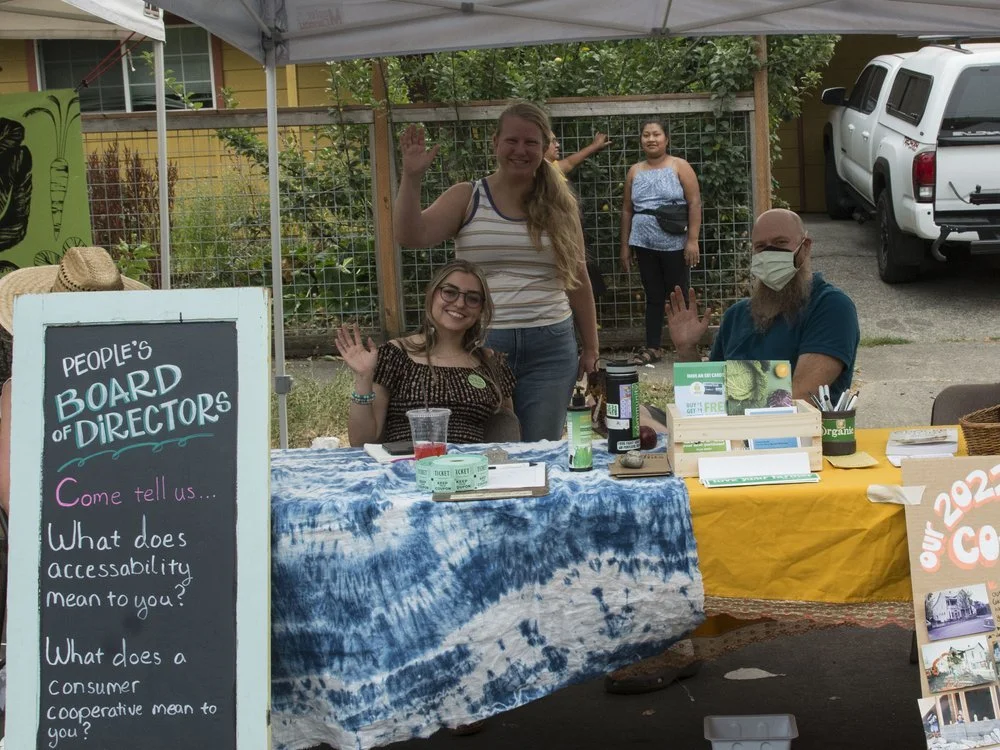Written by Marc Brown, Director
Edited by Charlotte Clement, Director and Collective Manager
When it comes up in casual conversation that I am on the Board of Directors of People’s Food Cooperative, the reaction is often one of surprise. “People’s is a nonprofit?” is often the response. While it is true that nonprofits have directors and many of us are most familiar with the role of a director in a nonprofit, all corporations are required to have a board of directors consisting of owners who are elected by the owners to oversee the corporation. We often think of directors of a corporation as wealthy investors in some large multinational corporation. The Carl Ichan’s of the world. However, People’s, as a cooperative corporation, has a board of directors in the same way that Apple or General Motors have boards of directors.
As the conversation continues, the question arises about what a director of People’s Food Cooperative does in that role. The answer is that a director at People’s has a very similar role to a director at Apple or General Motors. The one significant difference has more to do with People’s nonhierarchical management structure. In a traditional hierarchical corporation, the CEO, manager, or executive director is the link between the directors and the operation. In other words, the directors are not involved in the day-to-day operations of the business. Instead, they rely on the expertise of the CEO.
At People’s, which is collectively managed, the Directors have delegated the authority of the manager to the Collective Management or CM. In our model, the CM chooses one of its members to be the “Link” between the operations and the directors.
Often, when describing what People’s Board of Directors do, it is easiest to begin with what the Directors do not do. A Director does not directly oversee the daily operations of the store. For example, if a Director is in the store and notices that the Co-op no longer stocks their favorite chocolate bars, that Director does not have the authority, as a director, to order the Collective Management to resume stocking that chocolate bar. As an individual Owner, that Director could make a request that People’s resume stocking that item but that Director is not acting under their authority as a Director but as an Owner and customer. A director also does not have the authority to act on their own without a Board vote to authorize them to do so. The authority of the Board of Directors is as a whole and not as individuals.
Having explained what the Directors of People’s do not do, what is it that they do? First and foremost, the Directors represent the interest of the Member-Owners. It is ultimately the owners who have elected the Directors and they empower the Board of Directors to act on their behalf. The Board has three primary roles: provide a long-range vision for People’s, engage the owners, and ensure that People’s acts within the law.
The Directors provide long-range vision primarily through its Ends statements. The Ends statements are the aspirational goals of People’s, or the point on the horizon towards which we steer. The Ends statements, created by the Board of Directors, is:
A passionate community working together for sustainability, progressive land and animal stewardship, human rights, and social and economic justice.
1. Thriving Cooperative and Local Economies
2. A safe welcoming community where all are valued
3. Democratic workplace where all workers’ voices are valued
4. Access to healthful foods our customers can trust
Every action that the board takes should further these Ends. If People’s is operating in a manner that goes against one of those Ends, the Board’s role is to use its authority to redirect that particular action to align with the Ends. For example, if the Board of Directors is informed that a person felt like they experienced discrimination while shopping at People’s, the Board asks the Collective Management, through the Collective Management link, to investigate the complaint and report back to the Board.
Additionally, the Board has created a number of policies to guide the Collective Management. These policies do two things. First, the policies ensure that the Cooperative is operating within the law and in a financially prudent manner. At the start of each year, the Board sets out a schedule for the Collective Management to report on each policy. The Directors review the reports to ensure that the Collective Management is following the policies. Second, the policies guide the activities of the Board by providing procedures within which the Board operates. The Board can modify, delete, or add policies as it deems necessary.
The second role of the Directors is Owner-Member engagement. The Directors are elected by the Member-Owners and represent the interest of the Owners. Each Director is an Owner. To keep the owners informed about People’s, the Directors seek opportunities to engage the Owners in conversation around People’s. This may be in the form of a book club on a topic related to People’s or a presentation sponsored by the Directors or staffing a table at the Farmer’s Market and any of a number of creative ways to engage with the Owners.
Finally, the Directors are responsible for ensuring that People’s is operating within the law and in a financially responsible manner. Oregon has specific laws that apply to cooperative corporations. In essence, those laws require the Directors to act in the best interest of the Cooperative, and to avoid conflicts of interest. Additionally, the Board, by the corporate bylaws and policies, requires the CM to get approval from the board prior to committing People’s to certain financial liabilities.
That all sounds like a lot of work. Why would a Member-Owner decide to become a Director? If asked, each Director likely has their own reasons. For me, it stems from an interest in working with a diverse group of creative and dynamic individuals; Directors and the CM. I am also a strong believer in the cooperative economy and being a Director allows me to engage in ways to build upon the success of People’s as a consumer-owned cooperative. Finally, I believe it is critical for each owner to step up and serve as a Director. Over People’s 53-year history, the Board has been critical to People’s continued viability and, for People’s to continue its viability for another 53 years, it needs creative, dynamic, and enthusiastic Owners to take on the responsibilities of a Director. And, as a bonus, each Director gets a 15% discount on all store purchases.
Over the next few weeks, you will see Directors at the Farmer’s Market and in the courtyard. Stop by and ask them why they decided to step up and become a Director. Perhaps their answers will resonate with you. If so, you can ask them about becoming a Director. The election season is upon us.


